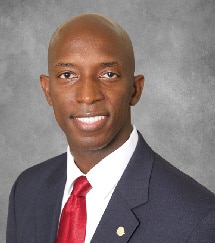President Obama seeks Bipartisan Agreement in Congress
By Michelle Austein Brooks
Washington — Eager to pass an economic stimulus bill with support from leaders of both political parties, President Obama visited the U.S. Capitol January 27 to talk with Republican congressional leaders.
Noting that America is in the midst of an economic crisis, the president said he is eager to implement the American Recovery and Reinvestment Plan, which is aimed at creating millions of jobs and stimulating the economy.
But to make the estimated $825 billion plan a reality, Congress must pass legislation. To facilitate that process, Obama already has changed provisions in his plan to meet concerns of congressional leaders from both parties. (See “Obama Seeks ‘Collaborative, Consultative Process with Congress’.”)
Obama’s Democratic Party holds a majority in both the House of Representatives and the Senate. And, even though congressional Democrats do not always share the president’s views, U.S. news media outlets say enough Democrats are expected to vote in favor of the plan to secure its passage. Nonetheless, the president is seeking Republican support as well.
LEGISLATORS DEBATE
As is common in U.S. politics, Republicans and Democrats disagree about the best way to stimulate the American economy. In its current form, Obama’s plan calls for about two-thirds of the package to consist of spending on infrastructure projects that create new jobs and the remaining one-third to be tax cuts.
Democratic congressional leaders, as well as Obama’s economic advisers, say that investing in infrastructure projects will create jobs. With this plan, about 3 million to 4 million jobs are estimated to be generated by such activities as modernizing schools and developing alternative energy sources, Lawrence Summers, head of the White House’s National Economic Council, said January 25.
Summers, speaking on NBC’s Meet the Press, said, “When the government spends one dollar creating a job, that person has a higher income. Because they have higher income, they are able to spend more, that creates other jobs down the road.”
House Minority Leader John Boehner, a Republican from Ohio, said on Meet the Press that members of his party have a different view: “If we allow American families to keep more of what they earn, they’re going to save it, invest it or spend it, all of which are good for the economy.” Boehner and other Republican leaders favor an economic plan that would provide more tax credits and less infrastructure investment spending.
The House and Senate plan to hold votes on the plan within the next few days. Each is able to put forth its own bill, so even if both chambers pass bills there likely will be differences between the House and Senate versions that must be negotiated and reconciled into a single version that both chambers can approve and send to the president. Obama has said he hopes to sign such a bill into law by mid-February.
COURTING REPUBLICANS
Although he probably does not need Republican support to get his economic plan passed, Obama wants bipartisan backing for this major economic initiative.
The president came to Capitol Hill to hold separate meetings with Republican leaders in the House and Senate. Ahead of his meetings, Obama spoke via phone with Democratic leaders, encouraging them to drop a provision disliked by Republicans from the House version of the bill.
Speaking at the Capitol between meetings, Obama said he had a good exchange of ideas with Republican leaders. “There are some legitimate philosophical differences with parts of my plan that the Republicans have, and I respect that.
“I don’t expect a 100 percent agreement from my Republican colleagues, but I do hope that we can all put politics aside and do the American people’s business right now,” the president said.
“Clearly, there are some differences that were expressed with regard to the economic rescue package,” Boehner said after meeting with Obama. “I think we both share a sincere belief that we have to have a plan that works, that will revive our economy, create jobs and help preserve jobs in our country.”
“The president is sincere in wanting to work with us, wanting to hear our ideas and trying to find some common ground,” Boehner said.
NEW FACES IN CONGRESS
As congressional business carries on, the membership of the 111th Congress continues to change.
On January 27, Vice President Biden, in his role as president of the Senate, administered the oath of office to Kristin Gillibrand, New York’s new senator. She replaces Hillary Clinton, who resigned her Senate seat to become secretary of state.
Gillibrand is one of four new senators in recent weeks. Others were appointed in Delaware, Illinois and Colorado to fill vacancies created by the departures of Vice President Biden, President Obama and Secretary of the Interior Ken Salazar.
There is still one vacancy in the Senate, as a Minnesota court reviews the results of a close election between Republican Norm Coleman and Democrat Al Franken — a process that could take months.
It is likely that new faces will continue to appear in Congress, as vacancies occur when officials resign to serve in Obama’s administration or for other reasons.


